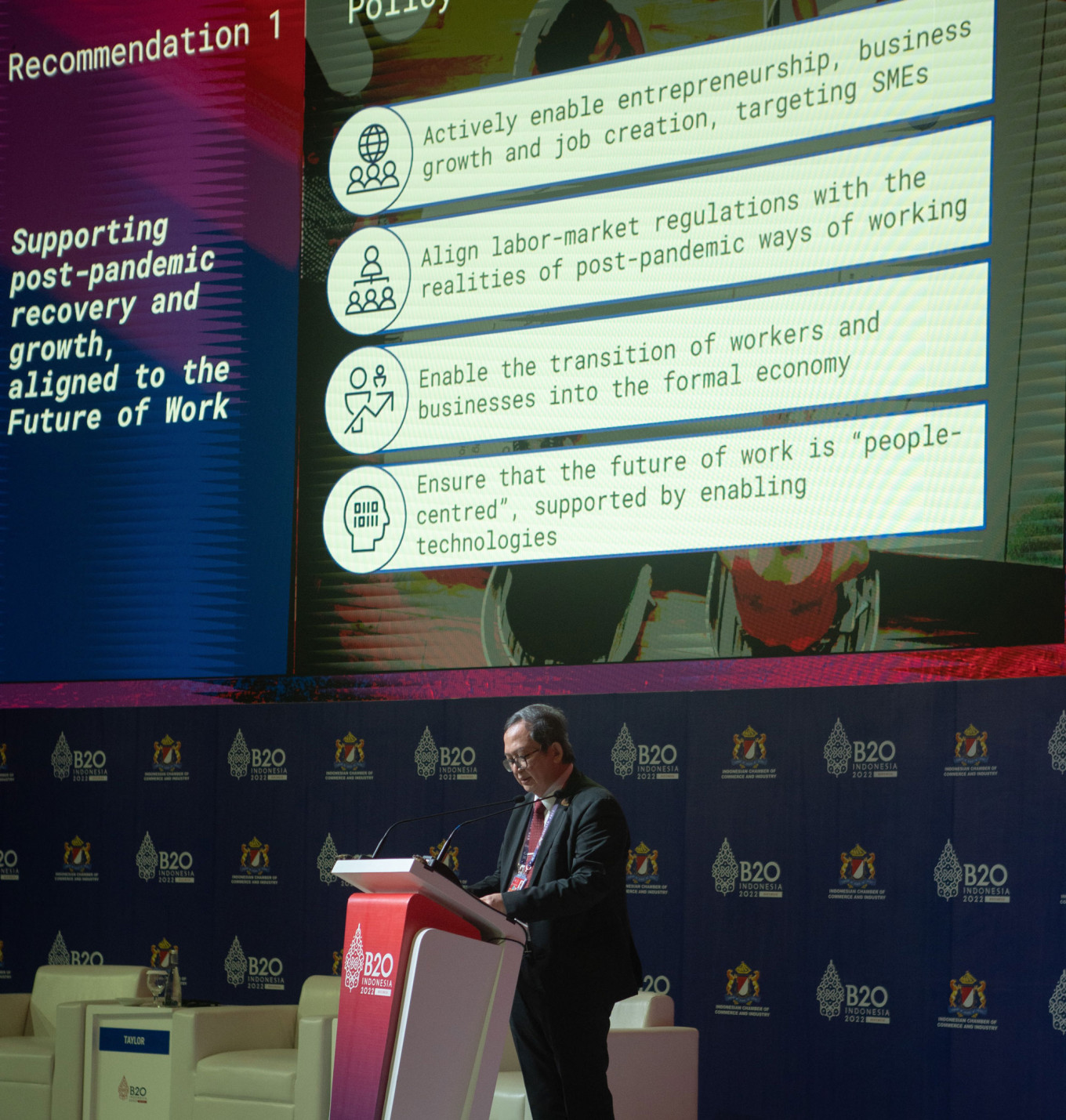Popular Reads
Top Results
Can't find what you're looking for?
View all search resultsPopular Reads
Top Results
Can't find what you're looking for?
View all search resultsPreparing the workforce of the future
The poor quality of the workforce, which has not been able to respond to the developments in the labor market is one of the causes of Indonesia's lagging productivity and lack of competitiveness.
Change text size
Gift Premium Articles
to Anyone
T
he poor quality of the workforce, which has not been able to respond to the developments in the labor market is one of the causes of Indonesia's lagging productivity and lack of competitiveness. Indonesia placed 37th in the world, out of a total of 64 countries in the IMD World Digital Competitiveness Ranking survey in 2021.
"Currently the problem lies in the gap in digital infrastructure between developed and developing countries, including financing, company readiness, digital literacy, including access to knowledge or education," said Hamdhani D. Salim, Chairman of the B20 FOWE TF.
Moreover, based on a research from the University of Indonesia and the International Labor Organization (ILO) related to the absorption of graduates from vocational training centers (BLK) by the industrial world, the number of those absorbed after graduation only reached 59.9 percent.
“Indonesia currently still lags behind in the quality of its human resources compared with other countries with the same income level. In 2022, Indonesia's human capital index ranked 96th out of 174 countries and was behind several Southeast Asian countries. Even during a pandemic, we are faced with the harsh reality that we lack medical personnel," said Arsjad Rasjid, chairman of the Indonesian Chamber of Commerce and Industry (KADIN).
The Future of Work & Education Task Force (FOWE TF), a sector of the B20, aims to tackle the problem of employment, which stems from a lack of vocational training set forth by the old educational curriculum. Furthermore, research by Accenture published in 2021 shows that 77 percent of young adults aspire to own or establish their own business, therefore becoming essential contributors to job-creation opportunities.
The FOWE TF outlined the reality of unequal job opportunities as one of their vectors of action, paying attention to “hidden workers.” These refer to the group of people who are largely unemployed or underemployed, possessing the skills required by companies, however unable to get a job because of underlying reasons. These include people with health issues, disabilities, gaps in employment history, family care responsibilities or inconvenient location, as well as disadvantaged and/or criminal backgrounds.
Based on the aforementioned research published by Accenture, in collaboration with Harvard Business Schools, CEOs worldwide reported that their number-one internal issue was attracting and retaining top talent, a problem that occurred before the pandemic. Cases show that when organizations seek “perfect” candidates, they often overlook perfectly capable ones, or so-called “hidden workers.” Although, the research found that companies hiring these people were 36 percent less likely to face talent and skills shortages.
In order to uncover more of the hidden workers, employers need to prioritize potential, despite a person’s personal and professional background. However, skills and fostered talents are important for those who seek employment. Therefore, the FOWE TF also outlined the need for equal education opportunities for the future, especially in terms of digital literacy.
Arsjad also noted that the latest McKinsey study said 30 percent of global workers will be replaced by automation by 2030. A World Economic Forum report estimates that by 2025, 85 million jobs may be displaced by machines, but 97 million new roles may emerge due to a new dynamic between people and technology. In addition, administrative work will also be replaced by AI technology as well as the natural resource industry sector, which will slowly transition to green industry.
Therefore the FOWE TF put forth four key learnings for the future of education that fulfils the needs of industry. Firstly, skilling people for new roles is one of the smartest things a business can do. Secondly, leveraging AI to enable people activation is essential, as the world is advancing to society 4.0. Management also needs to change the workplace culture to find the balance between expanding an employee’s career opportunities and creating growth opportunities for business as well. Lastly, businesses need to recognize that cross-industry collaboration is an accelerator.
This is all in addition to the needs of education and training, as highlighted by Presidential Decree No. 68/2022 concerning revitalization of vocational education and vocational training that continues to encourage and foster relationships between educational institutions and KADIN.
“One of the efforts that need to be done is through job creation and continuing education by building an integrated system that is able to create entrepreneurs, increase the capacity of MSMEs and improve the quality of the education system. Especially in the field of vocational and skill-based training such as digital learning for the post-pandemic era," explained Hamdhani D. Salim.
He further added that Indonesia is emphasizing the link and match program in the vocational field to ensure the country can smoothly transition to green energy and technology – the two fields that will bring more jobs in the future.










